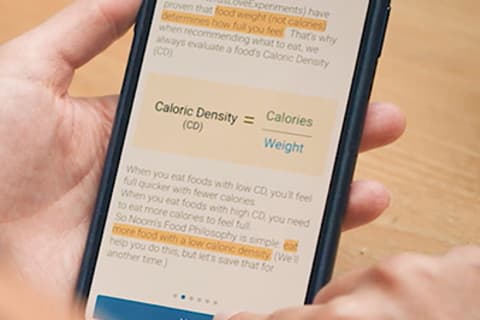With disruption to the comfort of routine comes new coping mechanisms and habits…not all of which are good for us. Whether you’ve been reaching for tortilla chips, find yourself easily agitated by those around you, or simply feel like your stress is getting the best of you, a little advice can go a long way. We sat down with Noom’s chief of psychology, Andreas Michaelides, to get some tips for finding calm in chaos and learn how to foster new habits to help ourselves. Also, everyone’s mental well-being is under pressure right now, making self-care more important than ever. Whether it’s taking an online meditation class or indulging in a relaxing bubble bath, choose an opportunity that will allow your mind to get a much-needed break. If you are experiencing serious symptoms of depression, please reach out to a mental health professional to help you navigate this uncertain and difficult time. Don’t wait around for motivation. Motivation ebbs and flows, and it can be particularly difficult to stay motivated when you’re trying to do something new that might feel uncomfortable. While it may seem counterintuitive, sometimes pushing yourself to do something—even when you don’t feel like it—can jump-start motivation and help you build momentum. Once the behavior is associated with something positive, like stress relief, increased energy, or even confidence, instead of discomfort or failure, it can be easier and more encouraging to do! Develop an internal cheerleader. Positive self-talk is not always an easy thing to develop. It is important to begin by noticing how we are talking to ourselves. The more aware we are of our thoughts, the more we can begin to filter out unhelpful thinking. Are we beating ourselves up for not working out one day? Perhaps there is a more adaptive way to look at the situation—“I am putting in a lot of effort,” or “I was able to complete other goals today.” Think about the strengths you are employing each day. The longest relationship we will have in life is with ourselves—let’s make sure we love and cheer ourselves on. In reality, multitasking does not exist. Our minds actually “task switch” and unconsciously go from one task to another in a very quick manner. This can lead to a drop in performance and execution since we are not solely concentrating on a single task or outcome and our minds become overwhelmed. Single-tasking (the opposite of task switching) actually allows you to get more done. Self-control or willpower is a limited resource. When we single-task, we sip on our self-control resource from a straw. When we balance and switch to multiple tasks in quick succession, we require several straws, but that doesn’t usually work, so we lose the lid and start chugging. Very quickly, our self-control vanishes, and stress ensues. Predicting the Future Some studies estimate that we spend about 47% of our time “stuck” in the past or predicting the future? Not physically, of course. But mentally, we do. For most people, this type of mental head space is one of the top sources of stress. Enter the solution: mindfulness! Mindfulness involves being in the present moment and can prevent you from experiencing the stress that comes from thinking about the past and/or the future. Staying Up to Get More Done Lack of sleep feeds into the stress cycle by affecting your memory, judgment, and mood, making you much more susceptible to feeling stressed. Not only are you more susceptible to stress, but lack of sleep lowers the threshold at which you perceive stress—meaning you’re likely to interpret the same situation as more stressful if you’ve had a late night versus when you’re well-rested. Those sabotaging thoughts can be a downward spiral; to pull yourself out of this pattern, it’s important to push through those emotional barriers by increasing your awareness of when they occur and remembering that your health is a journey. It can be helpful to remember that habits aren’t created overnight. Our behavior patterns are ingrained over a lifetime of decision-making, and changing them often takes more than one attempt. Instead of thinking about these moments as slip-ups, consider them an opportunity to practice and sharpen your habit-building skills! If you’re still struggling to settle your mind, don’t be afraid to ask for help from an expert—Noom’s psychology-based evaluations can help you get to the root of your worries. People can be very hard on themselves, berating their failures, and feel guilty when they fall back into old habits. This can add huge pressure and can really affect our mental health. However, when we break down unrealistic goals and expectations, then we can begin to see that we are capable of making changes when we set ourselves up for success. Change is often more about focusing on the journey and process and not necessarily the end result. Adopting new habits and routines can help us make sustainable changes that extend beyond “the number on the scale.” Instead of putting pressure on outcomes, make sure to applaud your efforts along the way, as it is the result of your commitment to completing the steps along the way toward your Big Picture Goal. If you or someone you know could use some extra assistance meeting your health goals, consult Noom for a psychology-based evaluation that can help you feel your best, one day at a time.






